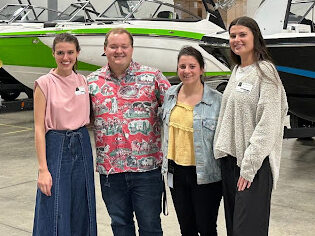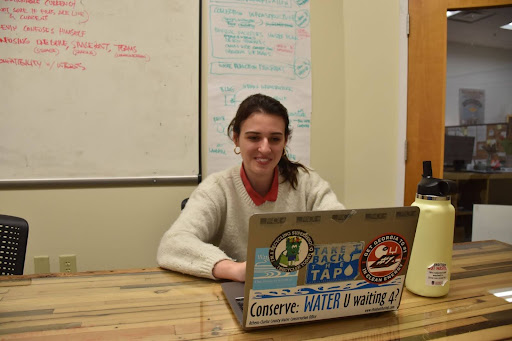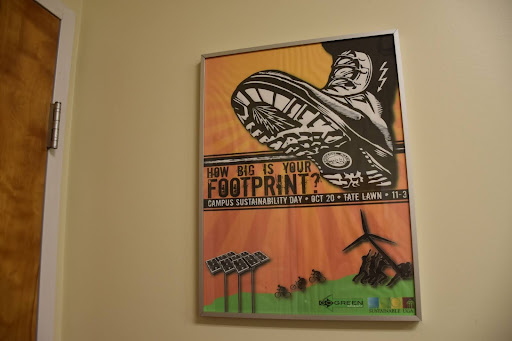
During the fall 2023 semester, University of Georgia students Maci Willetts and Elizabeth Finley teamed up with Yamaha Rightwaters for their semester-long Sustainability Certificate capstone project. Through intensive research, the duo was able to provide Yamaha Motor Corporation with deliverables to reduce its plastic waste and secondary carbon emissions.
Yamaha Rightwaters is an extension of Yamaha Motor, a multinational Japanese mobility manufacturer that produces motorized products, like motorboats. The program was launched in 2019 with the intention to implement more sustainable business practices through marine stewardship, manufacturing and product responsibility.
Marine stewardship efforts involve caring for and protecting aquatic environments, manufacturing efforts involve developing new factory processes to reduce and reuse waste and product responsibility involves educating customers on how to use Yamaha’s products responsibility on the water.
Finley, a fourth-year social entrepreneurship major, chose the topic due to her interest in the corporate sector’s intersection with sustainability. Willetts, a recently graduated ecology major, was drawn to the topic for her interest in water sustainability and conservation.
Why It’s Newsworthy: Humans produce more than 350 million metric tons of plastic per year, and plastic waste production is estimated to triple to 1 billion tons by 2060 if current policies remained unchanged. The findings from this capstone project are helping a massive corporation reduce its plastic waste and carbon footprint in order to mitigate some of the biggest issues facing the planet today.The students aimed to find the best method to optimize Yamaha’s internal plastic recycling process for its engine covers. Yamaha’s goal is to take responsibility for this plastic, rather than passing the pressure of it onto its customer-base of boat dealerships and manufacturers.
“In the sustainability world, it feels so easy to be like, ‘Well, just recycle it. That makes sense,'” Finley said. “But you want to actually look more closely under the surface and say, ‘Is this the best route for this?’”

To take responsibility for the waste, Yamaha is shipping the plastic from the individual dealerships to waste facilities.
The students assessed three routes for the plastic: pyrolysis, incineration and the landfill. They aimed to find the most feasible way of expanding the best-found method, with cost and carbon footprint from transportation considered.
UGA alum and Yamaha’s Sustainability Program Manager, Joshua Grier, and Yamaha’s Sustainability Coordinator, Julia Balte, met virtually with Finley and Willetts weekly to help them access data on the company’s business practices.
Grier graduated with the Sustainability Certificate himself, which is what led him to pitch the project to the program.
“Now that I was in the position to kind of give back to the kind of process that I had to go through … it felt wrong not taking advantage of that opportunity,” Grier said.
In the end, the best solution was pyrolysis. This subjects the plastic to intense heat in an oxygen-starved environment until its molecules separate, breaking it down to its base forms.
Grier said this finding was affirming, as it aligns with Yamaha’s current path for diverting its waste.
The students calculated carbon footprint by mapping out the distances of Yamaha’s top three customers to the Atlanta-based pyrolysis facility that Yamaha works with. This required finding the sizes of the UPS trucks, the gas they use, if they take the most efficient route and more.

A drawback of the solution is the carbon footprint associated with it, given that the travel distances from locations across the nation can be lengthy to the pyrolysis facility. Moving forward, Grier said Yamaha is exploring possible partnerships with other facilities to reduce this consequence.
The proposal Finley and Willetts generated, which was presented in December 2023, is helping the team at Yamaha work towards establishing a streamlined waste management process that can be replicated across its global branches. Yamaha is working to have zero landfill waste in its business activities by 2050, as outlined in “Yamaha Motor Group Environmental Plan 2050.”
However, Yamaha Motor’s metrics from 2021 to 2022 show that emissions slightly increased. Grier commented on this, saying that these reflect global numbers and through the Yamaha Motor Sustainability Fund and Yamaha Rightwaters, Yamaha Motor is building a “multiple pronged approach” to continue to address emissions and waste challenges to hit its 2050 target.
Finley now looks ahead at attending law school after graduation, with hopes to become an environmental lawyer. Willetts is in South America, teaching communities about sustainable farming through Worldwide Opportunities on Organic Farms.
Despite their busy schedules, both students still check in with Grier and Balte to get updates on what’s happening with their research at Yamaha.
“I’m very proud of the work that we did. And my hope for this is that it is attainable and accessible for boat dealers and boat producers across the nation,” Willetts said. “I hope that… they’re pioneers in this kind of stuff. And being true spokespeople for the opportunities of pyrolysis recycling.”
Jayden Henson is a senior journalism major, fashion merchandising minor and entrepreneurship certificate recipient at The University of Georgia. She is also the Eat & Drink Editor at The Red & Black.







Show Comments (0)